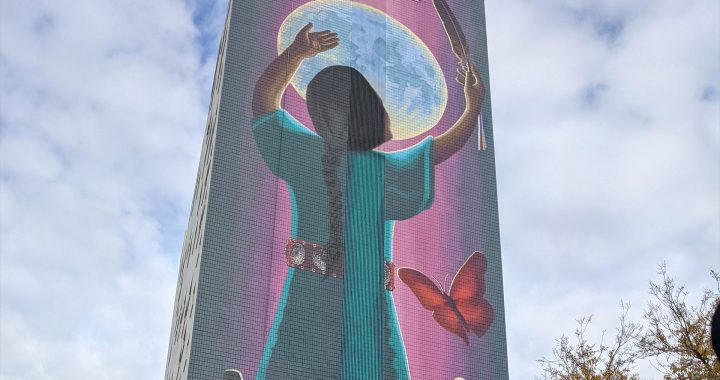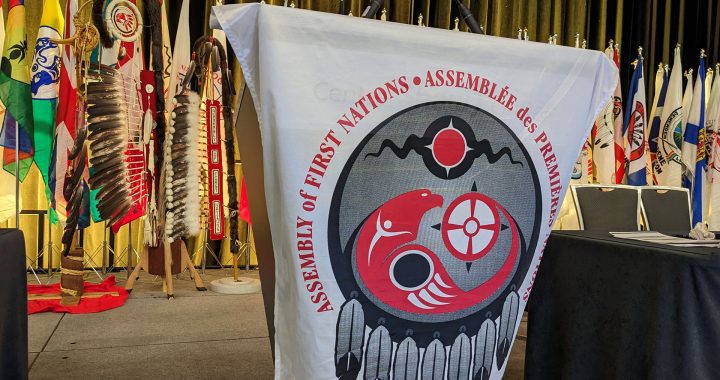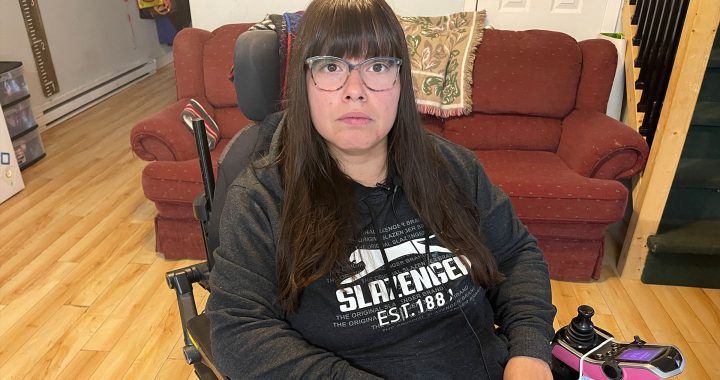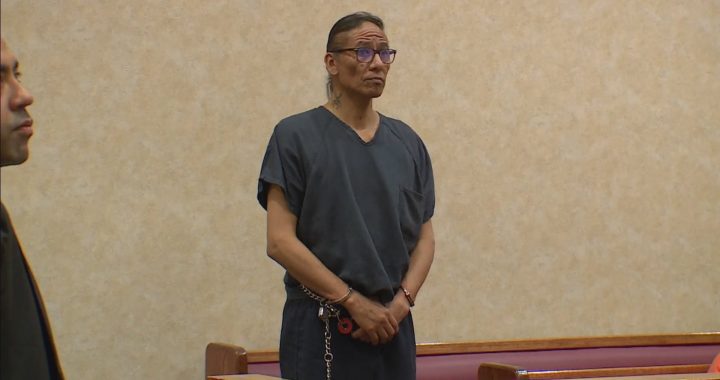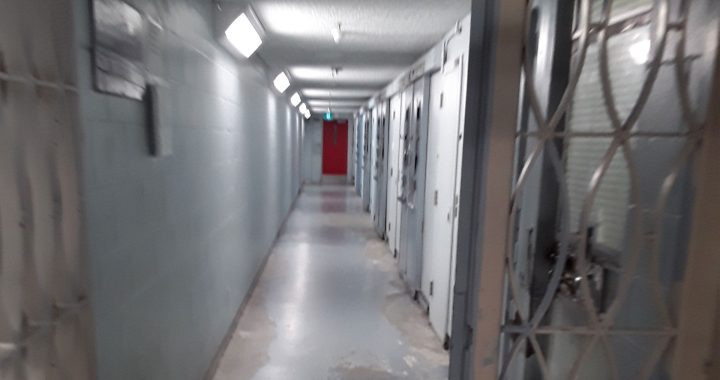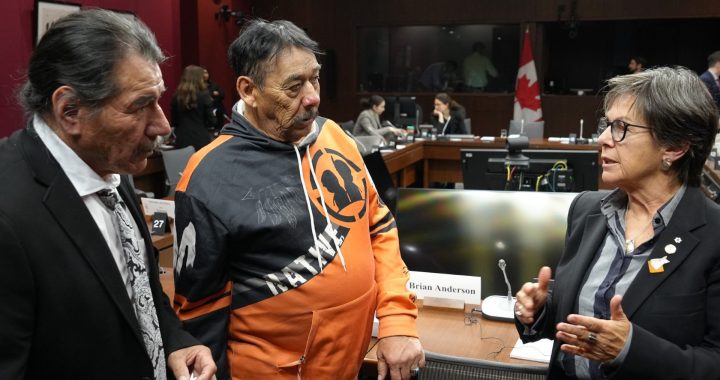
Jamie PashgumskumAPTN NewsA meeting between Indigenous Services Minister Marc Miller and representatives of the Turtle, Wolf and Bear clans of the Tyendinaga Mohawk Territory took place as planned but the talks that lasted into the night didn’t resolve the outstanding issues related to the protest that has shut down rail service in parts of Canada for nearly two weeks.The Mohawk leadership wanted to stress they aren’t blocking anything – but peacefully demonstrating and the decision to shut down rail service across the country came from Canadian National (CN).But they vow to keep their “roadblocks” in place “until the Wet’suwet’en people ask us to take them down,” said Mohawk leader tehonikonrathe said.Miller said there have been a lot of fears coming from the public mostly through social media but he said the population is not looking at the real issue.“I hear a lot of public statements that are ignorant. And I think ignorance is more dangerous then a lot of dangerous weapons. This problem isn’t going away,” Miller said. “A lot of us have sat on the sidelines.”Sometimes watching, sometimes not caring not even knowing throughout all this. You could open up these rails right now…it won’t solve the underlying problem.”Miller showed up to the meeting to “polish the chain” as he said in his email Thursday.Polishing the chain is a reference to the Silver Covenant Chain treaty of 1763 between the Haudenosaunee and the British monarchy.The chain is silver because from time to time it will need polishing, renewing the commitments of the treaty agreement.Traditional greetings took place then Miller was asked why he was there.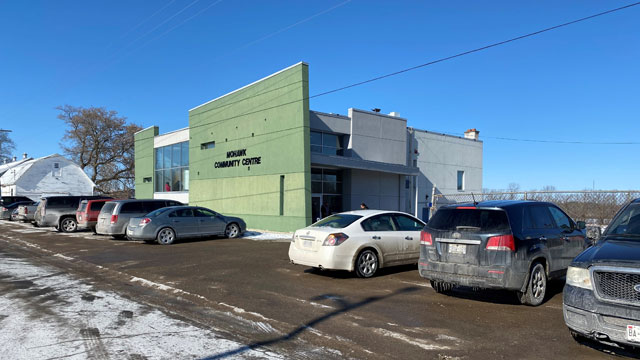 (The Mohawk Community Centre where the meetings between leadership and Indigenous Services Minister Marc Miller took place Saturday. Photo: Jamie Pashagumskum/APTN)Miller agreed that the Wet’suwet’en hereditary chiefs need to be listened to. He said what ever is resolved that the conversation needs to continue.tehonikonrathe, also known as Robert Fisher, is a self proclaimed, “red card holding, Mohawk passport carrying band card imposed Haudenosaunee.”“This is my licence and this is my diplomatic immunity. That in itself tells you who we are,” tehonikonrathe said.He said through its actions against the Wet’suwet’en, Canada has put their friendship with the Mohawk people in jeopardy.“This is our country. We are sovereign. We’ve taken away our permission to pass trains through our lands,” he said.On Feb. 6, RCMP enforced an injunction in B.C. that would give Coastal GasLink access to a work site for the pipeline, which is part of a $40-billion LNG Canada export project in Kitimat. More than two dozen protesters have been arrested for refusing to obey it.At the tracks outside Tyendinaga, Miller was informed that the Silver Chain Covenant was made with the Queen and only a representative of the Crown had the authority to polish the chain.The meeting at the tracks was a formality. The real meeting took place at the Tyendinaga Community Centre which lasted all day and into the night.Knia Singh Ma’at, is a lawyer with Ma’at Legal Services and a resident of Tyendinaga.He was at the meeting to support the people of Tyendinaga and all First Nations across Turtle Island.Singh is a human rights and criminal lawyer and says he is sympathetic to the plight of Indigenous peoples in Canada.He takes particular acceptation to Justin Trudeau’s comments that the Wet’suwet’en people need to respect the rule of law.“He’s correct, if Canada is going to observe the rule of law, they have to observe the agreements that they’ve made when it was the British Crown,” Singh said.The treaty he was referring to was the Royal Proclamation which specifically outlines that the Indigenous people’s lands are not to be touched. He says the land that the train tracks run historically belongs to the people of Tyendinaga.”Who is infringing on who?” he asks.“Its being positioned that the people here are protesting on tracks that are not theirs,” Singh said. “But if you really look through history, they’re actually on their own land.”
(The Mohawk Community Centre where the meetings between leadership and Indigenous Services Minister Marc Miller took place Saturday. Photo: Jamie Pashagumskum/APTN)Miller agreed that the Wet’suwet’en hereditary chiefs need to be listened to. He said what ever is resolved that the conversation needs to continue.tehonikonrathe, also known as Robert Fisher, is a self proclaimed, “red card holding, Mohawk passport carrying band card imposed Haudenosaunee.”“This is my licence and this is my diplomatic immunity. That in itself tells you who we are,” tehonikonrathe said.He said through its actions against the Wet’suwet’en, Canada has put their friendship with the Mohawk people in jeopardy.“This is our country. We are sovereign. We’ve taken away our permission to pass trains through our lands,” he said.On Feb. 6, RCMP enforced an injunction in B.C. that would give Coastal GasLink access to a work site for the pipeline, which is part of a $40-billion LNG Canada export project in Kitimat. More than two dozen protesters have been arrested for refusing to obey it.At the tracks outside Tyendinaga, Miller was informed that the Silver Chain Covenant was made with the Queen and only a representative of the Crown had the authority to polish the chain.The meeting at the tracks was a formality. The real meeting took place at the Tyendinaga Community Centre which lasted all day and into the night.Knia Singh Ma’at, is a lawyer with Ma’at Legal Services and a resident of Tyendinaga.He was at the meeting to support the people of Tyendinaga and all First Nations across Turtle Island.Singh is a human rights and criminal lawyer and says he is sympathetic to the plight of Indigenous peoples in Canada.He takes particular acceptation to Justin Trudeau’s comments that the Wet’suwet’en people need to respect the rule of law.“He’s correct, if Canada is going to observe the rule of law, they have to observe the agreements that they’ve made when it was the British Crown,” Singh said.The treaty he was referring to was the Royal Proclamation which specifically outlines that the Indigenous people’s lands are not to be touched. He says the land that the train tracks run historically belongs to the people of Tyendinaga.”Who is infringing on who?” he asks.“Its being positioned that the people here are protesting on tracks that are not theirs,” Singh said. “But if you really look through history, they’re actually on their own land.”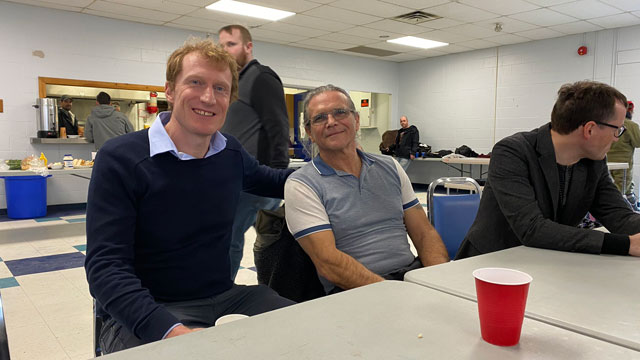 (Indigenous Services Minister Marc Miller, left, and Mohawk leader tehonikonrathe Saturday as talks got underway. Photo: Jamie Pashagumskum/APTN)Representatives from both sides say nothing was resolved at the meeting but it was a good start and opening of important dialogue.“We have a good beginning,” Fisher said. “I think both sides are willing towards a good solution”Fisher said at this point they will be holding their ground until the Wet’suwet’en ask them to stand down.Miller said progress was made.He said the Wampum was discussed and admitted that Canada hasn’t respected it at times. He said mutual respect, cooperation and friendship are the way forward.“If we’re going to be the country we think we are we need to have these open, painful conversations about who we are and how we live together,” Miller said.“There’s beautiful people in Canada that feel wronged and we have to deal with that in the best way possible, which is open peaceful dialogue in the spirit of collaboration and friendship.”
(Indigenous Services Minister Marc Miller, left, and Mohawk leader tehonikonrathe Saturday as talks got underway. Photo: Jamie Pashagumskum/APTN)Representatives from both sides say nothing was resolved at the meeting but it was a good start and opening of important dialogue.“We have a good beginning,” Fisher said. “I think both sides are willing towards a good solution”Fisher said at this point they will be holding their ground until the Wet’suwet’en ask them to stand down.Miller said progress was made.He said the Wampum was discussed and admitted that Canada hasn’t respected it at times. He said mutual respect, cooperation and friendship are the way forward.“If we’re going to be the country we think we are we need to have these open, painful conversations about who we are and how we live together,” Miller said.“There’s beautiful people in Canada that feel wronged and we have to deal with that in the best way possible, which is open peaceful dialogue in the spirit of collaboration and friendship.”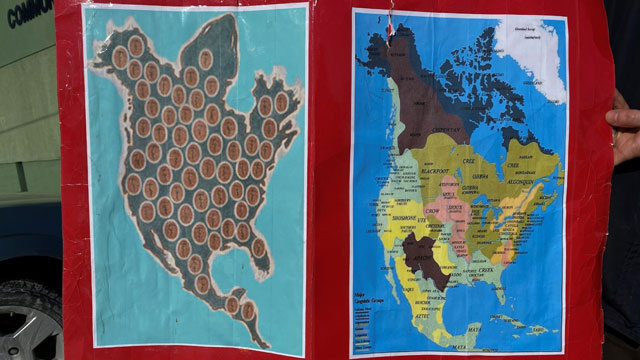 (Maps supplied for the meeting by Jocelyn Iahtail-Wabano show Indigenous land on Turtle Island. Photo: Jamie Pashagumskum/APTN)Miller said his next step is to talk with Prime Minister Justin Trudeau to move quickly to resolve the current situation so they can make real progress with the relationship that Canada has with Indigenous peoples.On Saturday, people milled in and out of the camps by the railway to deliver toilet paper and snacks at the Tyendinaga blockade, while a pizza restaurant delivered free pies to the demonstrators.As he arrived in Tyendinaga some nine hours before his meetings would end, Miller said the blockades have been divisive.“All of Canada is hurting,” he added. “The economy is slowing down. Everyone knows the reports about supply shortages, but we can’t move forward without dialogue.”CN obtained a court injunction to end the demonstration on Feb. 7, but the Ontario Provincial Police have not enforced it.The company also announced it had obtained fresh injunctions to stop three new blockades established on its network on Saturday, two in Vaughan, Ont., and one in Vancouver.”In Vaughan, protesters put their personal safety at risk by climbing on and between rail cars … Trespassing on railway property and tampering with railway equipment is not only illegal, but also exceedingly dangerous,” JJ Ruest, CN’s president and CEO, said in a written statement.The protest near the Tyendinaga Mohawk Territory will stay in place and at the moment, no new talks are planned.
(Maps supplied for the meeting by Jocelyn Iahtail-Wabano show Indigenous land on Turtle Island. Photo: Jamie Pashagumskum/APTN)Miller said his next step is to talk with Prime Minister Justin Trudeau to move quickly to resolve the current situation so they can make real progress with the relationship that Canada has with Indigenous peoples.On Saturday, people milled in and out of the camps by the railway to deliver toilet paper and snacks at the Tyendinaga blockade, while a pizza restaurant delivered free pies to the demonstrators.As he arrived in Tyendinaga some nine hours before his meetings would end, Miller said the blockades have been divisive.“All of Canada is hurting,” he added. “The economy is slowing down. Everyone knows the reports about supply shortages, but we can’t move forward without dialogue.”CN obtained a court injunction to end the demonstration on Feb. 7, but the Ontario Provincial Police have not enforced it.The company also announced it had obtained fresh injunctions to stop three new blockades established on its network on Saturday, two in Vaughan, Ont., and one in Vancouver.”In Vaughan, protesters put their personal safety at risk by climbing on and between rail cars … Trespassing on railway property and tampering with railway equipment is not only illegal, but also exceedingly dangerous,” JJ Ruest, CN’s president and CEO, said in a written statement.The protest near the Tyendinaga Mohawk Territory will stay in place and at the moment, no new talks are planned.




